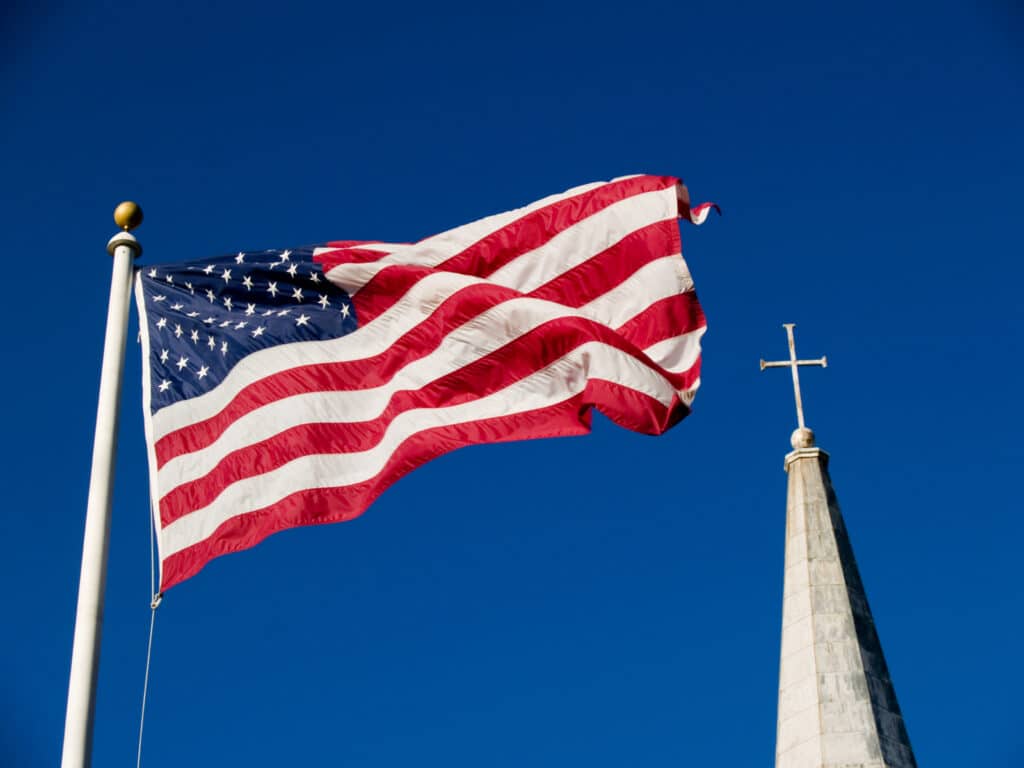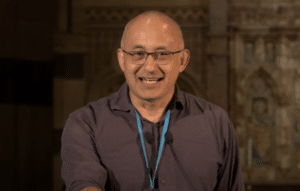
Rhys Bezzant
12 March 2024
We tell stories to children to help them feel like they belong, to know how to find their place in the world, and to give them understanding of their environment. Stories are powerful, yet stories can be dangerous as well if we don’t pass them on accurately or if we choose to use them to hurt others. The same is true of church history. Indeed, I love my job at Ridley for I get to tell stories about God’s people through the ages, and to give my students a narrative which helps them better grasp their own beliefs and to develop a sense of belonging. If we are not to be blown around by every wind of teaching, as the Apostle Paul says, we need firm anchors and robust sails. Church history helps.
Yet one of the greatest influences on 21st century Christians in Australia, the church in the United States, is barely known or understood. We need to engage with American Church history urgently to work out how to nurture spiritual health in our land. Both to understand how we are similar, and to understand how we are different.
America was the first country to be born with a mission statement, both in its English Puritan beginnings and in its revolutionary outgrowth, so its sense of purpose easily leads to the exercise of soft power in other nations of the world, in ways both Christian and cultural.
Read more: These four principles help us understand Anglican identity
Here are my top 10 reasons for learning about American church history:
One, the Pilgrims who migrated in 1620 and their close cousins the Puritans who came a little later in 1630 were Reformed Christians whose beliefs were not focused on individual conversion alone but on nation-building. Their faith was not confined to the doctrines of salvation but was also concerned with engaging God in politics, economics, culture and mission. They had an expansive vision for science, exploration and nature. One of the first things they did in the New World was set up a university, now known as Harvard, in 1636. They believed in a learned clergy and wanted to outshine the achievements of the England they had left behind, their homeland that some imagined they would return to soon enough. We should beware maligning the motivations and achievements of the Puritans, for their commitment to the missionary potential of education and statecraft was profound.
Two, Americans who travel in Australia find our country easy to navigate, for we use dollars, speak English, and watch the same movies. One of the most significant differences between our nations is only discovered after living here for a while. We have profoundly different views of authority. The United States has a 17th century Christian foundation with an 18th century Enlightenment overlay, the latter seen most clearly in its revolutionary documents. European Australia was birthed 150 years later at the high-water mark of the Enlightenment, with Christian faith a very present but not essentially substantive foundation. The rationalistic philosophy of John Locke (1632-1704) guided the early Enlightenment in North America, but it was the utilitarian philosophy of Jeremy Bentham (1748-1832) whose influence in Australia shaped different assumptions about authority and morality. For these and other reasons, both in society and in the church, Australians approach authority with more sanguine caution.
Three, when I studied at Ridley in the last century, we would often hear about the Wesley brothers and the birth of Methodism. A great failing in our offerings in those days was that we heard little to nothing about their contemporary in the American colonies, Jonathan Edwards (1703-1758), pastor, theologian, scientist, philosopher and revivalist. Yet his influence on evangelicalism worldwide has been prodigious. Often dubbed the “American Augustine,” Edwards preached and prayed for revival, then explained it theologically when it arrived. He was a polymath. While the philosophers were arguing that God was distant, Edwards explained how Christians could still believe that he was close. He knitted together head and heart in the experience of believers. His is a salutary medicine to contemporary Christianity which divides understanding from emotion, and which expects little from the Lord in terms of conversions or impact.
Read more: We need to talk like Australians if we want to reach them
Four, deeply embedded in the American DNA is the revolutionary spirit, assuming that the golden age lies in the future not the past. It is a spirit which sloughs off authorities which impede that forward march towards a “more perfect union.” This political stance has influenced the churches of the United States too. Throwing off English authority in the Revolution meant recreating the Church of England as the new “Episcopal Church,” with its model not England but Scotland, and the Scottish Prayer Book as the template for its own. Ever since, there have been different kinds of Anglicanism in the global church, and this posture of independence has affected other denominations as well. For example, there are literally thousands of American Baptist denominations! The revivals of the 18th century, with their talk of individual spiritual agency, reflection on the sovereignty of God in human experience, and an experience of freedom from sin that binds, provided some of the vocabulary for the Revolution itself, transposed into a political key.
Five, the strength of the laity has been a feature of the life of the church in America since the beginnings of the 19th century. As the population moved west, so Christian families were frequently without a church to belong to in the wilderness. Indeed, they often didn’t see other human beings from year to year in their isolated locations. Camp meetings brought believers together once a year for preaching festivals and seasons of communion, as Holy Fairs had done in the Scottish Highlands in days gone by. Authority resided less and less in authorised denominational leaders and more in locally validated and gifted lay preachers and pastors. Authority shifted from the one offering the ministry to those receiving it, a common assumption in Australia today. The disestablishment clause of the First Amendment to the US constitution, separating the church from the protection of the state, didn’t end of Christian ministry but led to the opposite: churches flourished in new and surprising ways! Revivalism decentred clerical power yet provided space for new kinds of parachurches and ministries. We ought not to fear the end of the Christendom project.
Read more: A modest proposal for Anglican education
Six, traditional theological authorities were further weakened in the wake of the US Civil War (1861-1865), during which Christians in both north and south struggled to understand how the Scriptures should be understood and applied to the morality and politics of slavery. A nation that appealed to the Scriptures for its reason for being experienced deep conflict. Indeed, in the later 19th century, Reformed expressions of theology paramount before the Civil War were frequently rejected and Arminian styles of theologising won the day, especially among emancipated African Americans who prized their freedom to choose God, affirming their agency and rejecting crude forms of predestination. Holiness movements became increasingly subjective in their approach to truth in reaction to the Civil War as well. A warning to us: beware of equating the Kingdom of God with any particular nation or political system.
Seven, the American Christian experience has spawned other challenges for the worldwide church. The complexity of US politics, the geographic diversity of the land, and the denominational variety of churches planted, has provided fertile soil for various groupings, such as the Mormons, Jehovah’s Witnesses, or Adventists, among other less well-known movements. The Second Great Awakening in the early years of the 19th century, and internal migration in later periods, encouraged febrile breakaway groups, who often had particular utopian or millenarian visions for church and society. A sense of American uniqueness fuelled their own self-confidence. Persecution in the eastern states suggested the necessity to move with the expanding frontier, leading the Mormons to settle in Utah for example. The doctrine of Manifest Destiny, a distortion of the Puritan City on a Hill, gave Joseph Smith and the second generation of Mormon leadership missionary energy which we still encounter. These movements built their ministry in a prophetic (not so much pastoral) key with impermeable boundaries in the absence of much experience of centralised church or government authority.
Eight, from the end of the 19th century, direct American influence in Australia grew markedly. Of course, we still knew ourselves to be imperial subjects. But perhaps this made us more open to the kind of imperial influences dawning in the United States, not least the reach of American revivalist culture, which found a ready home within rapidly industrialising communities and their nation-building agenda. In 1902, a most remarkable event happened in Melbourne, the so-called Great Simultaneous Mission. The global evangelist Reuben Torrey (1856-1928) from Chicago came to another great city of the Victorian age to conduct a mission. The contribution of the laity especially to the organisation, financing, execution and impact of the mission was extraordinary, building on significant Christian ministry already present in Marvellous Melbourne. With a population of just 500,000, some 17,000 preparatory meetings had been arranged before the mission began, involving 117,000 people. Over six months, every house in Melbourne was door-knocked twice, and tent meetings took place all over the city. At the Melbourne Town Hall, the Exhibition Building, and in dozens of suburban locations, a total of perhaps 250,000 attended the meetings, with many resulting conversions and the establishment of Christian ministries like Ridley College and the Upwey Convention (later Belgrave Heights). Melbourne was lauded as one of the great centres of gospel ministry in the world, though World War I was to chasten aspirations for service.
Nine, Dietrich Bonhoeffer studied on two occasions in New York City before the outbreak of the Second World War. He found his faith massively encouraged by his engagement with African Americans at the Abyssinian Baptist Church in Harlem, for they were able to connect vital piety with serious social engagement. He took home records of the spirituals they sang, which he played to his students in the seminary of the Confessing Church, of which he was director until it was closed by the Nazi regime. But one of his most searing comments about the United States church was that it was Protestant without the Reformation, meaning that it maintained Protestant values but had lost its sense of historical mooring. It espoused individual agency but not the social matrix which gave it birth. And this is no less true of Australia, perhaps more so. In a nation where history is devalued, or barely studied at all, our churches commit the same sins of neglect or forgetfulness. May we not so prize our sense of freedom, that we forget the hard-won achievements of our forebears, or fail to appreciate their sense of a bigger gospel story in which they were to play their part.
Read more: This Christmas, try concentrating on one gospel
Ten, modern politics is fractured in ways we haven’t known in living memory. Indeed our world feels more dangerous in comparison with the prosperous years of the mid to late 20th century. Many Christians are seeking easy answers and espousing the values of protest parties, whether in Germany, France or the United States. Many Christians in the US who are following Trump are known as evangelicals, though the secular media often confuse conservative values with religious motivations. Surely one lesson that we must learn from American church history is how to disentangle church from state – something purportedly the Americans have desired – even though they seem magnetically drawn to each other again and again. The kingdoms of this world must not be confused with the Kingdom of Christ in this age. Though part of larger cultural currents in modernity, the Australian church must nurture biblical reflection alongside theological acumen to provide both understanding and resistance, with the church in the US as a point of reference to sharpen our self-awareness and the contours of our own distinct mission.
The Reverend Canon Dr Rhys Bezzant is senior lecturer in Church History and dean of the Anglican Institute at Ridley College Melbourne.
For more faith news, follow The Melbourne Anglican on Facebook, Instagram, or subscribe to our weekly emails.






